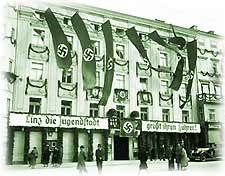Reports from Linz and the Gau Oberdonau 1938 - 1945
Evan Burr Bukey

Based on interviews with the public regarding significant events such as the „Anschluß“ (the annexation of Austria), the outbreak of war, the battle with the church, industrial change, the employment of foreigners, the attack on the Soviet Union, the German defeat at Stalingrad, the Moscow Declaration and the attempted assassination of Hitler, the average Austrian is largely reluctant to express his true opinions or to pass judgement regarding the NS regime. The true behaviour of the Austrian population was too inconsistent and too complex to be able to blankly assign it labels such as „consent“ or „dissent“, or „compliance“ and „resistance“.
Often rejection and agreement coexisted, depending on the specific policies of the National Socialist leadership. It was in many cases not associated with specific actions of the regime or with Hitler himself.
In spite of some trepidation at the beginning of the attack on the Soviet Union or at the long duration of the „Blitzkrieg“ the opportunities for economic advancement kept up the mood of the civilian population in the Gau Oberdonau significantly longer than in other areas. This also applied to belief in Hitler’s capacity for leadership (the Hitler myth), which persisted longer in his „adopted home town“ than in other towns in Greater Germany. At the end of the war the prevailing mood was a mixture of apathy, dejection and fear.